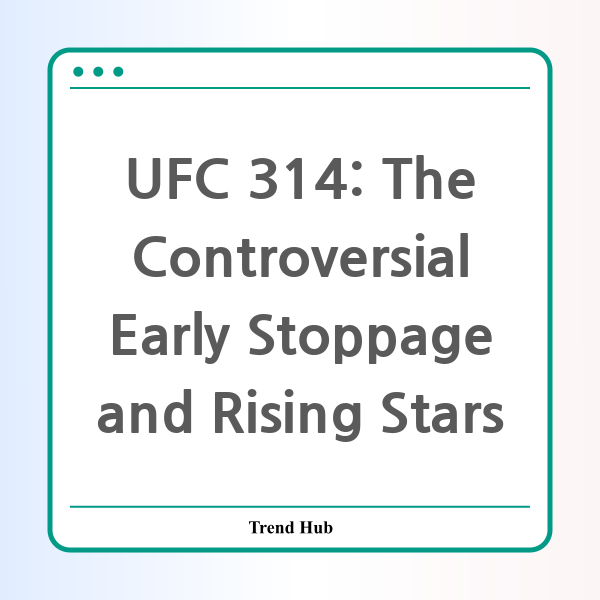* This website participates in the Amazon Affiliate Program and earns from qualifying purchases.

What happens when a fighter feels they were stopped too early in the octagon? This question came to the forefront during UFC 314, where Sedriques Dumas faced off against Michał Oleksiejczuk, a seasoned veteran making a comeback. The fight took an unexpected turn that has left fans divided and spurred lively debates about fighter safety and referee decisions.
At the vibrant Kaseya Center in Miami, UFC 314 was not just another fight night; it had stakes for both fighters. Dumas, a rising star, was looking to make a name for himself in the UFC, while Oleksiejczuk aimed to break out of a losing streak that had haunted him in recent bouts. With much anticipation, the fight began, but it quickly spiraled into controversy.
Just two and a half minutes into the first round, Oleksiejczuk landed a powerful forearm strike that knocked Dumas to the ground. Following that, a flurry of elbows and punches ensued from Oleksiejczuk, who was eager to secure a decisive victory. However, it was referee Marc Goddard who stepped in and halted the bout, declaring a TKO win for Oleksiejczuk. The stoppage came after Dumas had endured 19 seconds of relentless punishment, and it is this brief yet impactful timeframe that has ignited discussions among fans and commentators alike.
Dumas immediately protested the stoppage, making it clear that he believed he was still in the fight. As he remained on the canvas, he expressed his disbelief and frustration by punching the mat, signaling to both the referee and audience that he was still conscious and capable of defending himself. This sparked a wave of mixed reactions from the crowd and viewers at home. Some fans supported Goddard's decision, arguing that Dumas was not actively defending himself and that safety must come first, while others criticized the stoppage as premature, suggesting he deserved a chance to continue fighting.
"Why is Dumas throwing a fit and wasn’t defending himself or moving at all?” questioned one fan, highlighting the nuances of how fights are evaluated in real-time. Meanwhile, another defended Dumas, saying, "He wasn’t really getting hit. Therefore his head was not getting smashed in." This conflict of opinions showcases just how complex and subjective the reactions to fight stoppages can be.
Taking a step back, this fight not only highlights the individual battle between Dumas and Oleksiejczuk but also reflects broader themes in mixed martial arts regarding referee authority, fighter safety, and the emotional investment that comes with combat sports. Oleksiejczuk's victory comes after a critical partnership with Caio Borralho, who has not only been a former opponent but now a teammate at the Fighting Nerds gym. This collaboration, which includes a focus on strategy and skill development, has reinvigorated Oleksiejczuk's career and confidence in the octagon.
As the dust settles on UFC 314, both fighters walked away with valuable experiences—Oleksiejczuk securing a much-needed win and Dumas learning vital lessons about fight readiness and resilience. The controversy surrounding the stoppage ensures that this bout will remain in the conversations of fans, referees, and fighters as they consider the delicate balance between safety and fair competition.
In conclusion, events like UFC 314 remind us that the world of MMA is as unpredictable as the fighters themselves. As fans, we must navigate our opinions regarding referee actions while supporting our favorite athletes in their journeys. What are your thoughts on early stoppages? Should referees prioritize fighter safety even if it costs a fighter a chance at victory?
* This website participates in the Amazon Affiliate Program and earns from qualifying purchases.